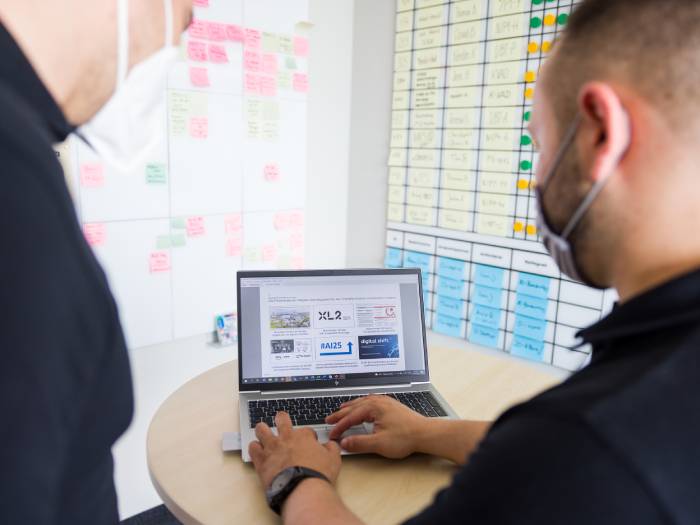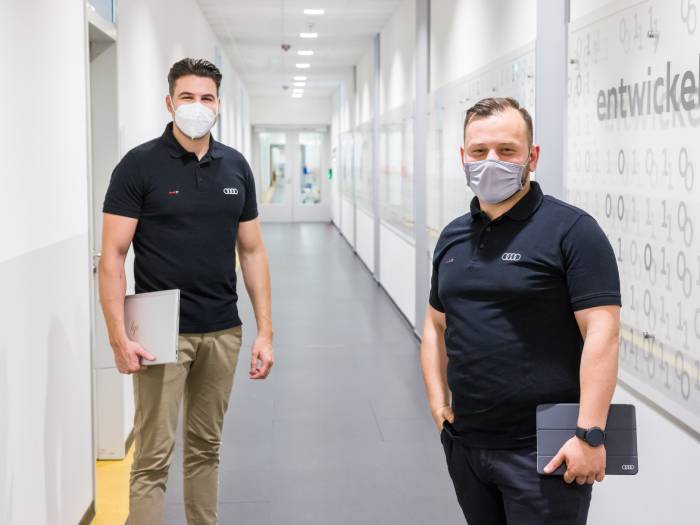Digital qualification: the Audi’s pilot project
Training and skills development are key for the digital transformation. A pilot project at the Neckarsulm site aims to provide twelve Audi employees, from traditional production departments, with the necessary skills before starting work in IT.
Updating and strengthening the workforce is a key part of the transition towards sustainable mobility. For this reason, Audi has launched a pilot project called “Digital Shift” at the Neckarsulm site, giving employees the opportunity to qualify for future jobs in Digital Production. An unconventional recruiting concept puts the focus on interests instead of qualifications. This program will serve as the blueprint for other similar initiatives, like the one which will soon be launched at the Ingolstadt site.
Hidden digital talents
The lighthouse project called “Digital Shift – in Production and Logistics” involved twelve employees from Production applying for the further training after it was promoted internally. The aim was to provide them with the know-how needed for the digitisation of production and logistics processes. “There are numerous talents at Audi just waiting to be discovered. Many of our employees have hidden abilities and knowledge outside of their job that are worth encouraging,” says Ivan Jukic, head of IT at the Neckarsulm site. “Some code websites or optimise gaming PCs in their free time. It’s exactly these employees that we want to attract with the program so that we can further expand our digital skills at the site.”
Training: from theory to practice

All participants build up their skills for working in the area of IT by alternating between theoretical training and practical learning. During and after the training, they can expect jobs in application operation, software development and IT infrastructure. The theory is taught by the Audi Akademie, with basic courses on hardware and software, as well as training on special topics such as big data, cybersecurity and SAP applications.
The training takes 6 to 18 months, depending on the level of prior knowledge, individual learning speed, and requirements of the future job. Training advisors from the Audi Akademie and specialists from all departments accompany the employees and adjust the duration and content of the courses based on the progress made and how far the skills have developed.
Internal selection
The recruiting concept for the Digital Shift project is somewhat unconventional: “We didn’t look so much at the career path of our employees, but rather at affinity with IT. We looked for people who, regardless of their qualifications, are passionate about and show potential for digitisation and IT topics,” says Stefanie Ulrich, head of HR at Neckarsulm.
The training team identified skills that each department needed, and then compared them with the applications, and the training programs were developed based on this. Eleven of the twelve participants have already completed their training at Audi: half in electrical engineering and the other in various areas such as body construction, warehouse logistics and production, toolmaking, and mechanical engineering.
The importance of training
The program is a good example of how Audi is transforming to prepare itself for the future, with courage and determination, a willingness to change, and a clear awareness of its own DNA. This process also calls for new ways of thinking and working within the workforce. Rolf Klotz, chairman of the Works Council in Neckarsulm, is also convinced that Digital Shift will open up new doors: “Many colleagues will have the chance to equip themselves for the transformation in an unconventional way. It is important to continue creating more creative training opportunities. There is still a lot of talent hidden in our workforce that we need to promote.”
From bodywork to apps

Bünyamin Akdemir and Sören Gall participated in the Digital Shift program. Akdemir is going to work as a product manager in the Audi’s IT infrastructure, turning his hobby into a career. In 2004, he began training as a bodywork and vehicle construction mechanic at Audi, later working in these department and then in the Surface and Special Vehicles division.
“To be able to develop myself together with the company is a great opportunity; I’ve always had an affinity with digital technology, and I recently programmed some smart home apps for my family home and realised once again just how much I enjoy it. When I found out about the further training, I applied for it immediately,” Akdemir tells.
From user to IT planner
Gall began to train as an electronics engineer for automation technology in Neckarsulm back in 2009. This was followed by his bachelor’s degree in production and process management, after which he completed a six-month internship at Audi’s support and analysis centre, and then the maintenance department. He was responsible for demand and procurement planning in the development of new facilities, using SAP applications on a daily basis.
A good foundation for further training in the area of in-house consulting and integrity for the SAP system. “I was often the contact person for SAP questions in daily business for my colleagues, and this gave me the drive to continue training so I could go from being a user to an IT solutions designer,” Gall explains.
Digital Shift
Both Akdemir and Gall agree that starting on a path of transformation also means continuously going outside your comfort zone and being open to new experiences. It is a process which requires a high level of drive, discipline, and independence, and at the same time a lot of support from colleagues in the department, human resources, the Works Council, and the Audi Akademie. “We feel very much appreciated,” Gall concludes.
The Digital Shift pilot project is just one piece of Audi’s human resources transformation process. “We are gaining valuable experience in small, bite-size chunks, which we can then scale up and transfer to other areas,” Stefanie Ulrich continues. For instance, the Digital Shift project is being brought to the Ingolstadt site under the name Digital Future: tech-savvy Audi employees can register for advanced training in IT. The aim is to draw applicants from other fields as well as production.
The Volkswagen Group
In the meantime, the Digital Shift project is ready to start its second round in Neckarsulm; the feedback provided by the first participants has been taken on board for the further development of the concept. “We have to continue expanding the digital transformation process,” adds head of IT Ivan Jukic, who then points out how Digital Shift is playing a key role in transforming and facilitating long-term development of the Neckarsulm site, which is becoming a leading factory for digital production and logistics within the Volkswagen Group.
Source: AUDI AG
VGI | Responsible OU: VP | Creation date: article date | Class 9.1
